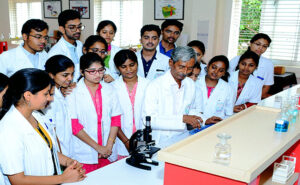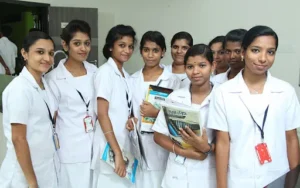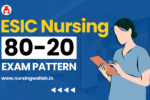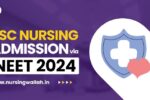ANM Vs GNM Vs BSc Nursing: Nursing is a prestigious field in India’s healthcare system. Nurses make up over 60% of the country’s health workforce. Even though India is the second most populous country, there is a nursing shortage. The patient-to-nurse ratio is inadequate. This shortage has created many opportunities for aspiring nurses.
If you’re thinking about a career in nursing after Class 12, there are several educational paths to consider. These include Auxiliary Nursing Midwifery (ANM), General Nursing Midwifery (GNM), and Bachelor of Science in Nursing (B.Sc. Nursing). Each course has its own focus, duration, and career prospects.
Auxiliary Nursing Midwifery (ANM)
ANM stands for Auxiliary Nurse Midwifery. It is a two-year diploma program. This program trains nurses for roles in community health. It includes a six-month internship. The focus is on primary healthcare services. Students learn to care for individuals and families in the community. They gain skills in health education and promotion.

The training covers maternal and child health, nutrition, and immunization. Graduates are prepared to work in rural and urban settings. They play a crucial role in improving community health. The ANM program equips them with the knowledge and skills needed to serve their communities effectively.
| Auxiliary Nursing Midwifery (ANM) Overview | |
| Category | Details |
| Curriculum | Health Promotion, Primary Healthcare Nursing, Child Health Nursing Midwifery Community, Health Nursing Gynecology and Midwifery Health Center Management |
| Eligibility | Age between 17 and 35 years Completion of Class 12 in Arts or Science with English Medical fitness |
| Career Opportunities | Community Health Centers, Government and Private Hospitals Dispensaries, Nursing Homes |
| Salary | Initial salary: INR 1.5 to 1.8 LPA With experience: INR 2 to 2.5 LPA |
General Nursing Midwifery (GNM)
The General Nursing and Midwifery (GNM) program is a diploma course that lasts three and a half years. It also includes a six-month internship. GNM offers more in-depth clinical education compared to the Auxiliary Nurse Midwifery (ANM) program. It focuses on providing comprehensive patient care. This program prepares students with the skills and knowledge needed for effective nursing practice.
| General Nursing Midwifery (GNM) Overview | |
| Category | Details |
| Curriculum | Medical-Surgical Nursing Nursing Administration & Ward Management Community Health Nursing Child Health Nursing Behavioral Science Bio-Science Research & Statistics |
| Eligibility | Age between 17 and 35 years Completion of Class 12 with Science, achieving a minimum of 40% aggregate and in English Completion of a vocational ANM course with 40% in English |
| Career Opportunities | Hospitals (both public and private) Nursing Homes Community Health Centers Research Institutes |
| Salary | Initial salary: INR 1.8 to 2.4 LPA With experience: INR 3 to 5 LPA |
Bachelor of Science in Nursing (B.Sc. Nursing)
B.Sc. Nursing is a four-year undergraduate degree. It focuses on nursing and medical sciences. This program provides a thorough education. It is perfect for those who want advanced roles in nursing. Students learn about patient care, medical procedures, and healthcare management. They also gain practical experience through clinical training. This degree opens many career opportunities in hospitals, clinics, and other healthcare settings. It is a great choice for those passionate about helping others and making a difference in healthcare.
| Bachelor of Science in Nursing (B.Sc. Nursing) | |
| Category | Details |
| Overview | B.Sc. Nursing is a four-year undergraduate degree that provides an in-depth education in nursing and medical sciences. The program is designed for individuals aiming for advanced roles in the nursing profession. |
| Curriculum | Anatomy and Physiology, Medical-Surgical Nursing, Community Health Nursing, Pediatric Nursing, Maternal and Child Health Nursing, Mental Health Nursing, Nursing Research and Statistics Nursing Education and Administration |
| Eligibility | – Age between 17 and 35 years Completion of Class 12 with Science, achieving a minimum of 50% aggregate and in English Valid entrance exam score (if applicable) |
| Career Opportunities | Hospitals (both public and private), Community Health Centers, Nursing Homes, Research Institutes, Educational Institutions, Government Health Departments |
| Salary | Initial salary: INR 2.5 to 3.5 LPA With experience: INR 4 to 8 LPA (can vary based on specialization, location, and role) |
Essential Skills Required for Nursing
Nursing is a demanding and challenging profession. It requires a strong commitment to caring for others. If you’re considering a career in nursing, it’s important to develop certain skills.
- Good Communication Skills: Nurses need to talk with doctors and patients regularly. Sharing information about a patient’s condition and treatment is essential. Clear communication helps everyone understand what is happening.
- Ability to Work Long Hours: Nursing often involves working beyond the typical 9 to 5 hours. Nurses must be prepared to work long shifts. Being on their feet for extended periods is common.
- Critical Thinking: Nurses are often the first to respond to patients. They need to make quick, effective decisions based on the patient’s condition. These decisions can significantly impact treatment outcomes.
- Attention to Detail: Nurses spend a lot of time with patients. They must be vigilant and notice small changes in a patient’s condition. These changes can be crucial for effective care.
- Empathy and Caring: Patients may be anxious or in distress when they come to the hospital. Nurses must be able to empathize with their situation. Providing comfort and support is a big part of the job.
Nursing is not just a job; it’s a commitment to helping others. Developing these skills will help you succeed in this rewarding profession.

ANM Vs GNM Vs BSc Nursing Starting Salary & Growth
While starting salaries for ANM and GNM nurses are lower than those for BSc Nursing graduates, there is great potential for growth as you gain experience. Your earnings can increase significantly depending on your specialization and career path. For example, a Nursing Superintendent can earn up to INR 7.5 lakhs per year. This is about INR 60,000 per month. Here’s a look at the typical starting salaries for each nursing course:
| ANM Vs GNM Vs BSc Nursing Starting Salary & Growth | |
| Course Name | Average Starting Salary |
| ANM Nursing | INR 10,000 – INR 15,000/- monthly |
| GNM Nursing | INR 15,000 – INR 20,000/- monthly |
| BSc Nursing | INR 15,000 – INR 25,000/- monthly |
Specializations such as ICU nursing, pediatric nursing, and surgical nursing often come with higher salaries. Additionally, pursuing higher education and certifications can further boost your earning potential in the nursing field.
Key Roles and Responsibilities of a Nurse
Here are the daily tasks a nurse typically handles:
- Administering First Aid
Nurses provide immediate care to patients with minor injuries. This includes cleaning and dressing wounds, applying bandages, and performing basic emergency procedures. - Monitoring Patients for Symptoms
Nurses closely observe patients for any new or changing symptoms. They take vital signs like temperature, blood pressure, and heart rate. They report any significant changes to the doctors. - Keeping Accurate Medical Records
Nurses maintain detailed and accurate records of patient health. They document symptoms, treatments, and medical histories. This helps in tracking patient progress and planning future care. - Ensuring Patients Receive Medications
Nurses ensure patients get the right medications at the right times. They check prescriptions, administer drugs, and monitor for side effects. This is crucial for patient recovery. - Interacting with Patients and Advising Them
Nurses spend a lot of time talking to patients. They offer advice on healthy practices and answer questions about treatments. This helps patients understand their care and feel more comfortable. - Assisting Doctors and Medical Specialists
Nurses help doctors and specialists during medical procedures. They set up equipment, prepare patients, and provide support throughout the process. This teamwork ensures smooth and effective treatment.

Choosing the Right Path
For ANM: This course is ideal for students interested in community health and primary care. It is a good option for those from non-science backgrounds. It also suits students seeking a shorter duration course. ANM focuses on basic healthcare and midwifery.
For GNM: This program is suitable for those who want more clinical experience than ANM offers. It is a good choice if you do not wish to commit to a four-year degree. GNM provides a strong foundation in general nursing and midwifery. It includes hands-on training in various healthcare settings.
For B.Sc. Nursing: This degree is best for students from a science background. It is perfect for those who want a comprehensive understanding of nursing. The course offers more opportunities for higher education and specialization. B.Sc. Nursing covers advanced topics and provides in-depth clinical experience. It prepares you for a wide range of nursing careers.
ANM vs. GNM vs. BSc Nursing: Which Path is Right for You?
If you’ve finished 12th grade in a non-science stream, the ANM (Auxiliary Nurse Midwife) program is your best entry point into the nursing field. After completing the ANM program and getting your nursing registration, you can go on to pursue a GNM (General Nursing and Midwifery) course. Successfully finishing the GNM course will then make you eligible for a BSc (Nursing) Post Basic program.
If you come from a science background and want practical experience before advancing your education, starting with a GNM course is a good option. After completing the GNM course, you can choose to enroll in either a BSc (Nursing) Basic or BSc (Nursing) Post Basic program. Moreover, GNM graduates who have at least two years of experience can also apply for BSc (Nursing) Distance programs.
For those who have studied science and want to start their career immediately after school, a BSc in Nursing is a great choice. This degree also allows you to continue your education further, such as pursuing an MSc in Nursing. Eventually, you can even aim for advanced degrees like a Ph.D. or explore various career opportunities in the nursing field.
| Parameters | ANM Nursing Program | GNM Nursing Program | BSc Nursing Program |
|---|---|---|---|
| Full Form | Auxiliary Nursing and Midwifery (ANM) | General Nursing and Midwifery (GNM) | Bachelor of Science in Nursing |
| Duration | 2 years | 3.5 years | 4 years |
| Educational Qualification | 10+2 from a recognized Board | 10+2 from a recognized Board | 10+2 from a recognized Board |
| Age Criteria | 17-35 years | 17-35 years | 17-35 years |
| Entrance Exams | Conducted by State Nursing Examination Boards | Conducted by State Nursing Examination Boards | State-level or University-level Examination |
| Average Starting Salary | INR 10,000 – INR 15,000 | INR 15,000 – INR 20,000 | INR 15,000 – INR 25,000 |
Take or Leave Decision – ANM vs GNM vs BSc Nursing
If you’ve finished Class 12 but didn’t study science, the ANM (Auxiliary Nurse Midwife) program is the best option to start a career in nursing. After you complete the ANM diploma, you can register as a nurse. Then, you can enroll in the GNM (General Nursing and Midwifery) diploma program. Once you finish the GNM course, you’ll be eligible for the BSc Nursing and BSc (Post-Basic) Nursing programs.

For those who studied science in Class 12, especially if you took Biology, starting with the GNM diploma is a great choice. After completing the GNM course, you can move on to the BSc Nursing or BSc (Post-Basic) Nursing degrees. If you have at least two years of work experience after your GNM, you can also apply for BSc Nursing Distance programs.
Here’s a table summarizing the pathways to enter the nursing field based on educational background:
| Educational Background | Pathway | Further Education Options |
|---|---|---|
| Non-Science Stream (Class 12) | 1. Enroll in ANM (Auxiliary Nurse Midwife) diploma program.
2. After ANM, pursue GNM (General Nursing and Midwifery) diploma program. |
1. Register as a nurse after completing ANM.
2. Pursue BSc Nursing or BSc (Post-Basic) Nursing after GNM. |
| Science Stream with Biology | 1. Start with GNM (General Nursing and Midwifery) diploma program.
2. GNM graduates with 2+ years of work experience can opt for BSc Nursing Distance programs. |
1. Pursue BSc Nursing or BSc (Post-Basic) Nursing after GNM. |
| Science Stream (Preferred Academic Focus) | 1. Directly enroll in BSc Nursing program. | 1. Pursue MSc Nursing after completing BSc Nursing. 2. After MSc Nursing, pursue a PhD or seek professional employment. |
If you’re a science student who prefers to focus on academics before working, pursuing a BSc Nursing degree is a strong option. This program allows you to continue with an MSc in Nursing. After completing the MSc, you can choose to pursue a PhD or seek professional employment in the field.
Stay updated with the latest nursing job alerts and related updates by joining our Telegram and WhatsApp channels. Connect with us today to stay informed about new opportunities and developments in the nursing field.










